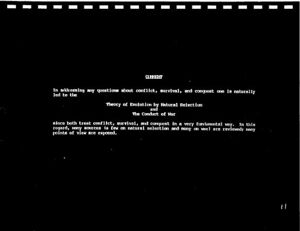Patterns of Conflict
| The works of |
| Works of John Boyd |
|---|
OODA WIKI Edition
Quantico Transcription
When you start addressing conflicts around conquest, you begin, two things begin to surface. The idea of evolution by natural selection, the Darwinian concept, and the conduct of war. Now I know that some of this stuff is a challenge, but there’s some great points of view in there that are quite valid. Like [unintelligible] war. So if you can blend these together, pretty soon you’re going to get insight into why you get hammered.
You can’t know military history by only looking at military history. Now I know you’re all looking at me kind of strange. There was a proof, which I’ll talk about, talk about in another [unintelligible] by a [unintelligible] named Godel in 1931. Kurt Godel.[1] He said you cannot determine the consistency of system within itself, or you can’t determine the character and nature of a system within itself. So you just can’t understand military history by only looking at military history. You got to look at related kinds of things too. You know, a military historian may take exception to that, but that’s tough, that’s life. Of course they’re still back in the 17th, 18th century. If they’d look and study some of this 20th century stuff, they’d understand this.
Now I got this idea that Godel, Heisenberg,[2] the second law[3] and many other people can be applied today, where you can pull the other guy’s socks down if you do things a certain way.
And as a matter of fact, as I was explaining to the colonel back here, I ran the experiment on myself, an unwilling participant. And I’ll tell you, you never want to go through it. Very, very bad thing to go through. I’ll try to say more about that later on. I was an unwilling participant but I didn’t know it at the time.
What I’m trying to tell you, these things are very powerful, there’s some very powerful stuff here and there are some things we found out in the 20th century we’re still not applying. We still look back in the 17th, 18th, and 19th century. I’d like to think we at least understand the 20th century before we depart into the 21st. And if you’re going to say, “well, Clausewitz is my model,” Christ, that means you haven’t gone much beyond 1832. And some people don’t realize they’re
using Clausewitz as their model, they’re making a big mistake even though they haven’t read him. But I look and [unintelligible] gee, this is Clausewitzian. [unintelligible] in the meantime they’re getting cut to ribbons. I’m not just talking about Clausewitz. I don’t care whether you take Jomini as your model, or whether you take only Sun Tzu. There’s other ways to look at it.
Remember we said we’re looking for those invariants that crisscross among many of those things. Okay?
Lightfoot Transcription
- ↑ 9 Kurt Godel’s “incompleteness theorem” posited that the consistency of any system cannot be proved from within the system.
- ↑ 10 Werner Heisenberg’s Uncertainty Principle stated that the very presence of someone observing a system introduced an element of uncertainty into the system being observed.
- ↑ 11 Boyd refers to the second law of thermodynamics, which states that the entropy or disorder of a closed system will always increase over time.
